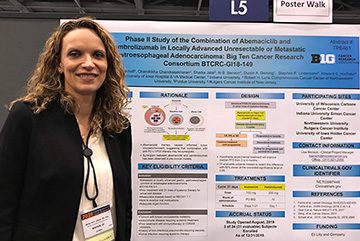Jan. 27, 2020:
A new Big Ten Cancer Research Consortium phase II study will test the combination of gedatolisib and talazoparib in advanced triple-negative or BRCA 1/2-mutated HER2-negative breast cancer in men and women.
Breast cancer is the most common cancer in women, with more than 266,000 new cases in 2018. Breast cancer in men is less common, with more than 2,400 new cases annually. About 15 percent of all invasive breast cancers diagnosed in the United States each year are triple-negative. Triple-negative breast cancers don’t express the estrogen receptor (ER), progesterone receptor (PR), or human epidermal growth factor receptor 2 (HER-2). Inherited gene mutations in BRCA1 or 2 are responsible for about 5 to 10 percent of breast cancers in the United States.
People with advanced triple-negative breast cancer have fewer treatment options and the primary treatment for triple-negative breast cancer is chemotherapy. Exploring non-chemotherapy options for treatment may uncover new ways to treat this disease.
The goal of the study, BTCRC-BRE18-337, “Phase 2 Trial with Safety Run-In of Gedatolisib Plus Talazoparib in Advanced Triple Negative or BRCA1/2 Positive, HER2 Negative Breast Cancers,” is to identify the safe doses for combining gedatolisib and talazoparib, and to assess the efficacy of the combination. Read More






 Located in Baltimore, Md.,
Located in Baltimore, Md., 
 Veronika Bachanova, MD, PhD, associate professor of medicine, Division of Hematology, Oncology and Transplantation at the University of Minnesota, has been appointed to represent the University of Minnesota on the Big Ten Cancer Research Consortium Steering Committee.
Veronika Bachanova, MD, PhD, associate professor of medicine, Division of Hematology, Oncology and Transplantation at the University of Minnesota, has been appointed to represent the University of Minnesota on the Big Ten Cancer Research Consortium Steering Committee.
















Subscribe to the Big Ten CRC Newsletter X
X Facebook
Facebook YouTube
YouTube